How Netflix's The Trial of the Chicago 7 gets the true story right
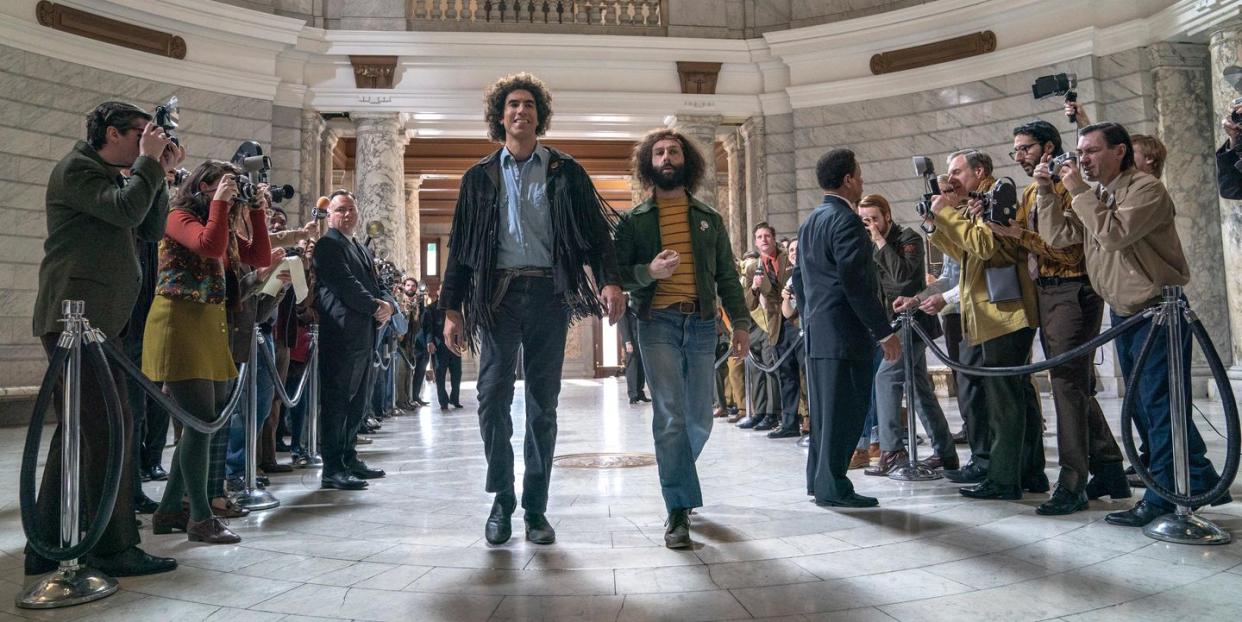
Aaron Sorkin is perhaps best known for adapting true-life stories into blockbuster films — from The Social Network to Molly's Game to Steve Jobs. His recent foray into the past for film fodder was with The Trial of the Chicago 7, released in select cinemas and to Netflix on October 16.
As is typical in a Sorkin-written film, The Trial of the Chicago 7 moves at a quick pace with fast-talking (though Chicago 7 was slower than most other Sorkin flicks) so if you aren't up on the true story, you may find yourself confused. None the less, the film is moving, well-acted, and follows an important moment in history.
Though it's odd to put a spoiler warning on a film that follows a true story from 50 years ago, we'll say it now — if you haven't watched The Trial of the Chicago 7, know little about the historical event and want to go into the film as such, there are spoilers from here on out.
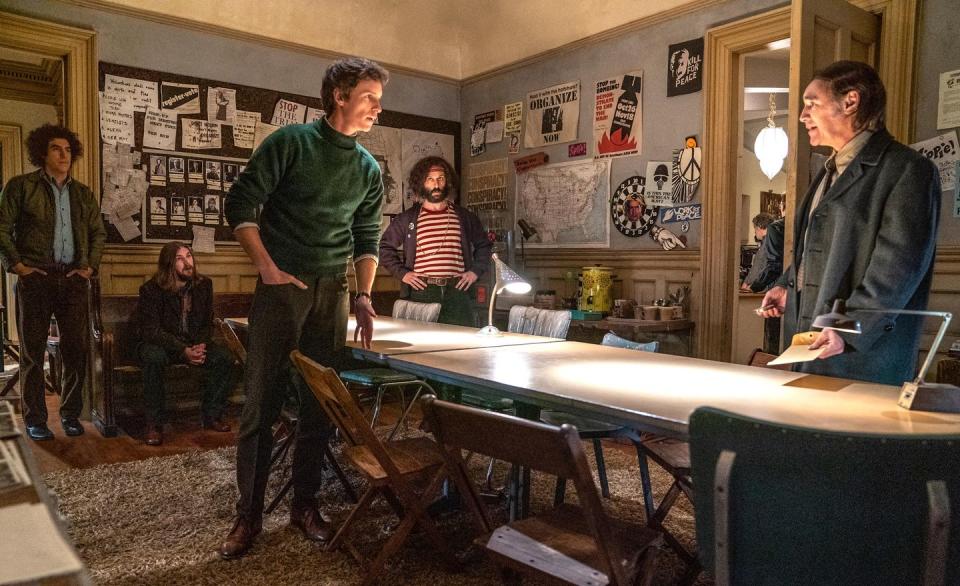
The cast is undeniably where the strength of the film lies. Though it's full of recognisable faces, each actor blends almost seamlessly into their role and give impassioned and nuanced performances.
The historical backdrop of the film is the 1968 Democratic National Convention, which took place after the assassination of Robert F Kennedy and Martin Luther King Jr. It was an uproarious but also scandalous time in American history.
Ahead of the convention, three disparate groups of left-leaning activists were preparing to join an anti-Vietnam war demonstration outside the Hilton in Chicago, where the DNC was being held.
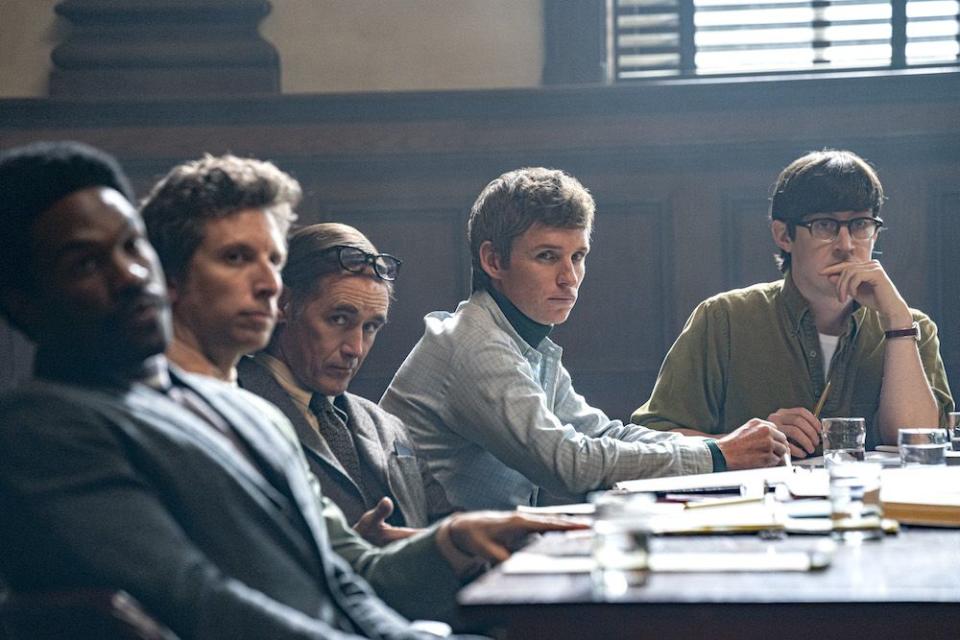
They were the Students for a Democratic Society (SDS), the Youth International Party (Yippies), and David Dellinger who was the chairman of the Fifth Avenue Vietnam Peace Parade Committee (but effectively was a lone operator for the premise of the film).
Now, for the cast. Eddie Redmayne plays Tom Hayden, president of the SDS, with Alex Sharp as Rennie Davis, his best friend and fellow SDS member.
Sacha Baron Cohen plays Abbie Hoffman, the Yippies' co-founder, along with Jeremy Strong as Jerry Rubin, the Yippies' other co-founder. John Carroll Lynch played David Dellinger, along with Noah Robbins as Lee Weiner and Daniel Flaherty as John Froines, two other anti-war activists.
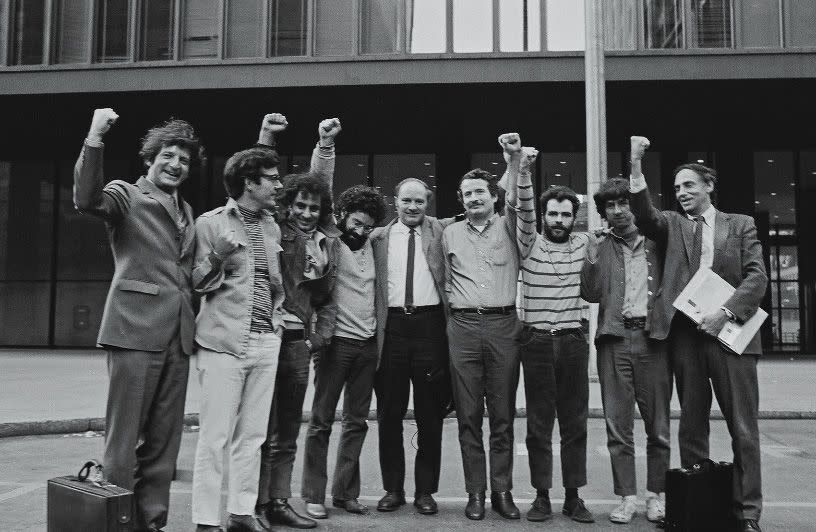
The demonstration turned into a riot in which police brutalised protestors. According to The Guardian, "[a]fter four days and nights of violence, 668 people had been arrested, 425 demonstrators were treated at temporary medical facilities, 200 were treated on the spot, 400 given first aid for tear gas exposure and 110 went to hospital. A total of 192 police officers were injured."
Fast forward nearly two years: republican Richard Nixon narrowly was elected president and a changing of the guard took place. As a result, attorney general Ramsay Clark (Michael Keaton) was replaced by John Mitchell (John Doman) who decided to indict the aforementioned seven protestors (Tom, Rennie, Abbie, Jerry, David, Weiner and Faherty) and Black Panther president Bobby Seale (played by Yahya Abdul Mateen II).
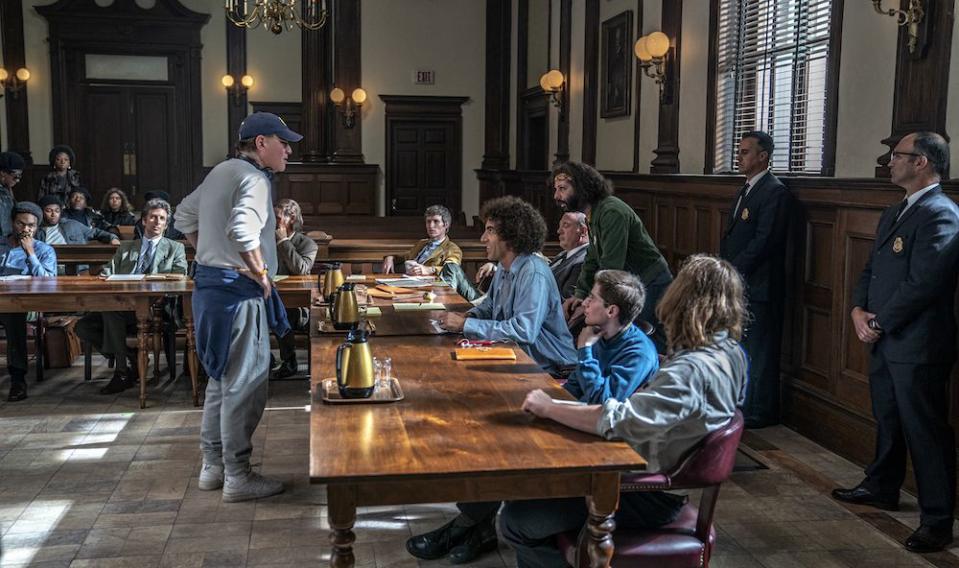
The case hinged on a law passed explicitly to limit free speech, and the charges were as follows:
• That all eight defendants conspired [our emphasis] to cross state lines to incite a riot, to teach the making of an incendiary device, and to commit acts to impede law enforcement officers in their lawful duties.
• That David Dellinger, Rennie Davis, Tom Hayden, Abbie Hoffman, Jerry Rubin and Bobby Seale individually crossed state lines to incite a riot.
• That John Froines and Lee Weiner instructed other persons in the construction and use of an incendiary device.
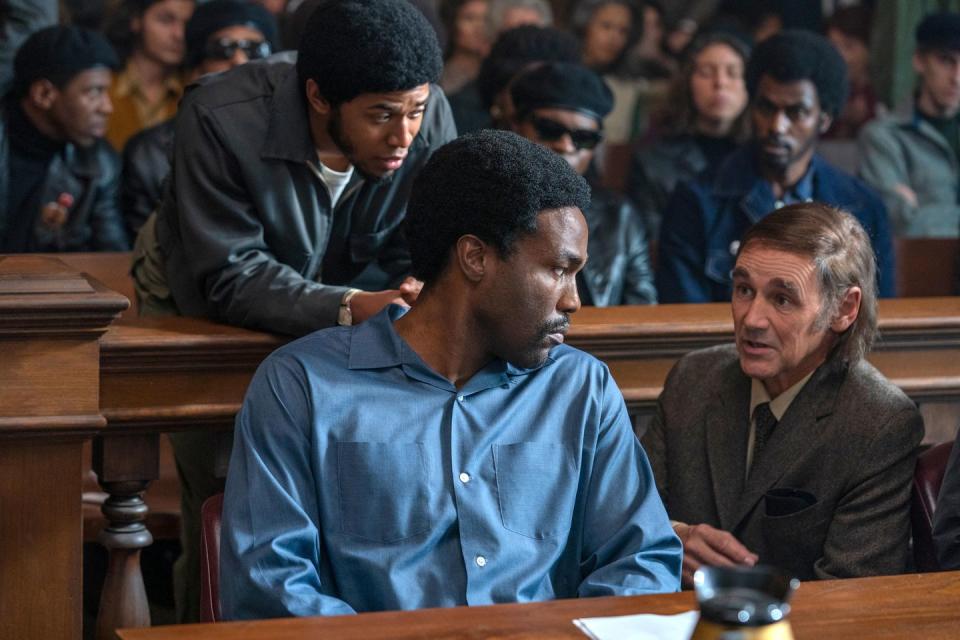
At this point, it's worth noting that there were eight defendants but Seale would eventually be severed from the case. But we'll get to that in a minute.
Mitchell chose prosecutors Richard Schultz (Joseph Gordon-Levitt) and Tom Foran (JC MacKenzie) to try the case, and the judge was Julius Hoffman (Frank Langella). The defence lawyers were William Kunstler (Mark Rylance) and Leonard Weinglass (Ben Shenkman).
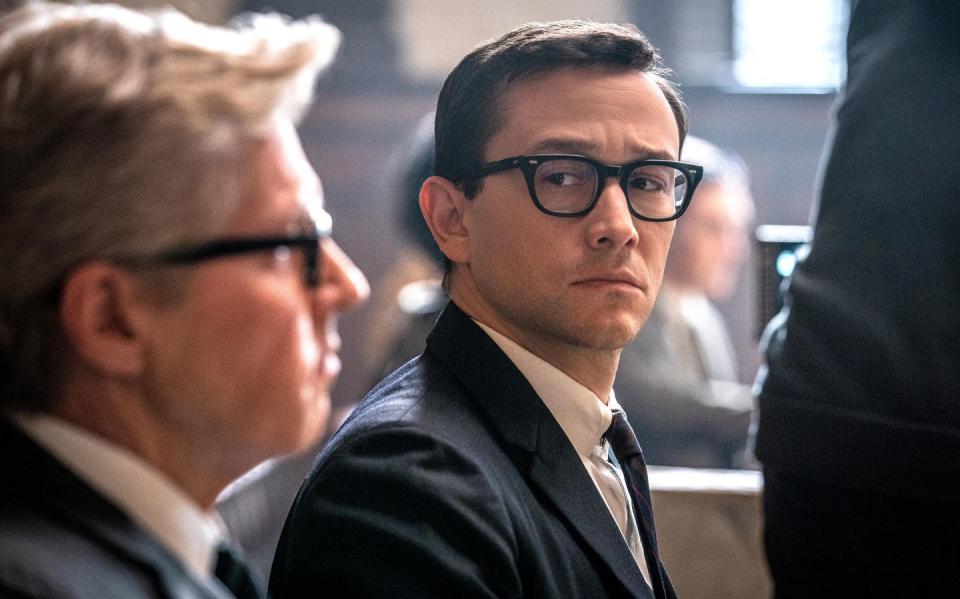
A major point of contention for the defence was the lack of representation for Bobby Seale. As explained in the film, his lawyer was undergoing surgery and the judge refused to postpone the trial, leading to a huge violation of Seale's constitutional rights.
But the judge's racist impunity didn't stop there. As accurately and viscerally portrayed in the film, Hoffman went so far as to have Seale bound and gagged in the courtroom for speaking out about his right for representation.
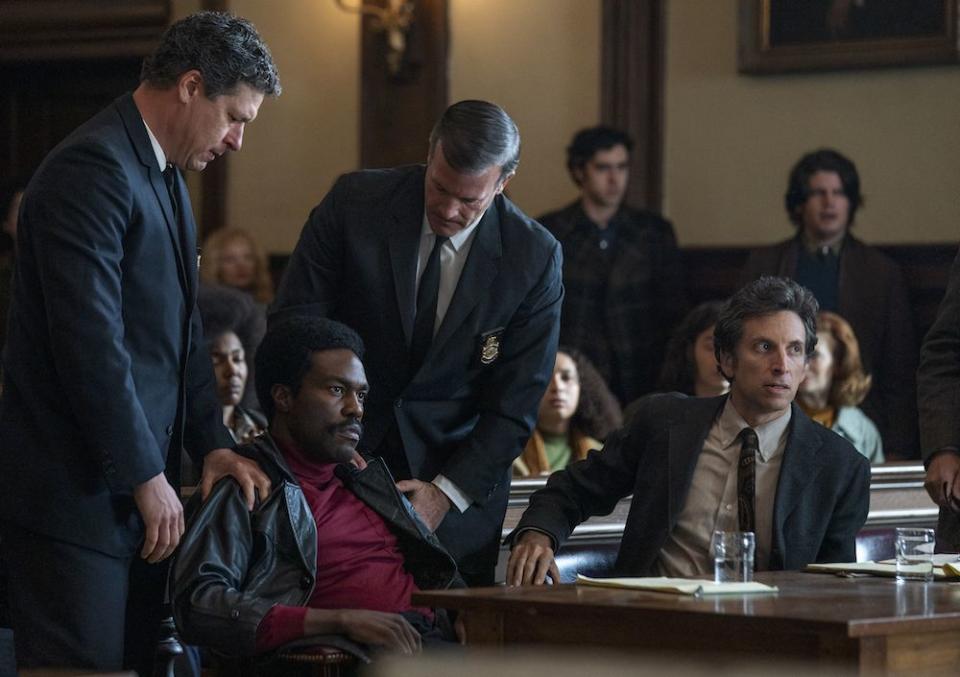
Eventually, perhaps to avoid further accusations of racism, Hoffman called a mistrial in Seale's case, and the defendants were now seven. The trial was, as Abbie described, wholly political and effectively a sham.
All seven were acquitted of the conspiracy charge, but only Froines and Weiner were wholly acquitted. The remaining five (Tom, Rennie, Abbie, Jerry, and David) were found guilty of the incitement-to-riot charge.
However, all of the convictions were eventually reversed by the United States Court of Appeals on the basis that the judge was biased in his refusal to permit defence attorneys to screen prospective jurors for cultural and racial bias, and the FBI surveillance of the defence lawyers' offices.
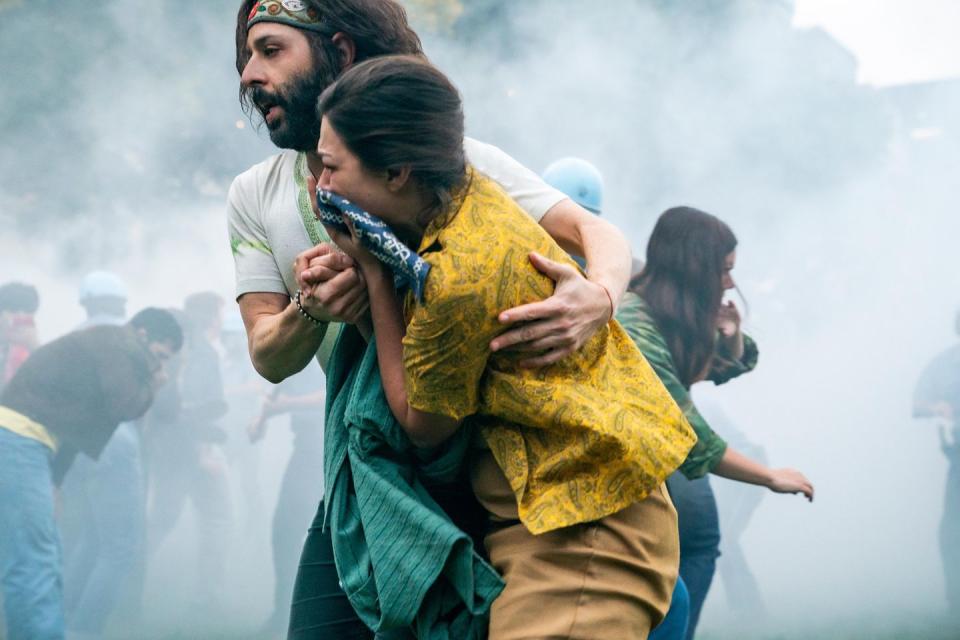
The movie does a visceral, if horrifying, job of showing just how biased the judge was, and how absurd the charges were. The lingering feeling that The Trial of the Chicago 7 leaves us with is a strange sense that we're living through these very same events right now: police are acting with impunity against Black people to violent, fatal ends and the justice system (particularly in America) seems to be anything but.
Though the movie ends on an Oscar-bait note of hope (a major disappointment in an otherwise unflinching film), Sorkin hewed fairly close to the actual events of the trial and the riots, and we wholeheartedly recommend watching it.
The Trial of the Chicago 7 is now available on Netflix
Digital Spy has launched its first-ever digital magazine with exclusive features, interviews, and videos. Access the latest edition with a 1-month free trial, only on Apple News+.
Interested in Digital Spy's weekly newsletter? Sign up to get it sent straight to your inbox – and don't forget to join our Watch This Facebook Group for daily TV recommendations and discussions with other readers.
You Might Also Like
